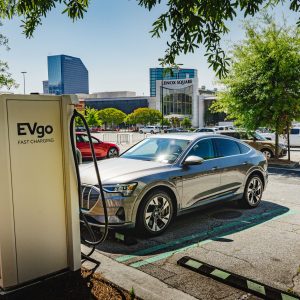 So, you’re expecting a new member of the family? No, not one of those loud, messy things… a new electric vehicle (EV). You know that emissions from gas-powered cars are contributing to a warming world. You know that, over the summer, Congress passed climate legislation with tax credits that will — at least eventually — make some electric vehicles easier to afford. But now there’s a more fundamental issue to grapple with: What will it take, and how much will it cost, to set your house up for an EV?
So, you’re expecting a new member of the family? No, not one of those loud, messy things… a new electric vehicle (EV). You know that emissions from gas-powered cars are contributing to a warming world. You know that, over the summer, Congress passed climate legislation with tax credits that will — at least eventually — make some electric vehicles easier to afford. But now there’s a more fundamental issue to grapple with: What will it take, and how much will it cost, to set your house up for an EV?
Do I need to buy a charger before I get an electric vehicle? Probably not. Almost all electric vehicles come with what’s called a level 1 charger, chargers plug directly into a standard outlet. Though easy, they also charge a car’s battery at a slow rate. You’ll only be able to add dozens of miles of range with an overnight charge, and it may take more than a day to fully charge an empty battery. If you live in a older home, you also need to make sure that your home’s electrical system can handle the additional burden of charging a car.
The next step up is a Level 2 charger, what you generally you hear about when installing an EV charger at a home. Because they’re more powerful, consumers can fill up their battery overnight, and get dozens of miles of range added by plugging the car in for an hour. Level 2 chargers require a different kind of plug and you’ll need to call an electrician to get one set up. Whether or not you’re going to want to go to a Level 2 has a lot to do with how far you drive every day. Another consideration is whether you have other opportunities to charge your vehicle. If there’s a lot of public chargers near your office or on the street where you live, then the urgency isn’t there in the same way it is if you’re really going to be depending on your own residence to charge your car.
Level 3 chargers are the fastest of all, but because of the power they require, they are rarely installed at a private residence.
How do I know if my home can accommodate an electric vehicle? First rule of EV charger installations: some installations are more complicated than others. If you rely on street parking, your home likely can’t accommodate an EV. As long as you’ve got a driveway, a garage or somewhere else to store your car, you can install an electric vehicle charger. It’s easier and less expensive if you’re able to park the car close to an existing power source. These days, you can buy chargers that come with about 25 feet of cable, so as long as you can park within that distance, you should be in good shape.
If you have a detached garage not connected to a power source and that’s located far from the house, you’d need to connect the garage to the property’s electrical panel to install an EV charger. That could involve trenching and running the cable underground, even cutting through the surface of the driveway before refilling and recovering it.
Another predicament for prospective EV owners is whether your home’s electrical system is equipped to handle the additional load of charging a car. A licensed electrician can help you answer that question. An indication that you’ll need an upgrade is if you look at your electrical panel and it doesn’t have any room for additional breakers.
How much does it cost to have an EV charger installed? Depending on where you live and how complicated the job is, installation costs vary widely. If you had a panel right next to where you want to park your car and you’re putting a charger in that’s just a few feet away, that type of installation by a licensed electrician, including permitting, might generally start at $500, but most installations will cost between $1,500 and $3,000.
Keep in mind that if your electrical panel or underlying electrical service (the amount of electricity that can be supplied to your house by the public utility) needs upgrading, that total can escalate quickly. An EV charging station is basically just a dedicated line of power, and in order to run a dedicated line, your panel must be able to support it. If you need a new panel, expect to pay an additional $2,000 to $4,000 on top of the cost of having the EV charger installed. If you need a full electrical service upgrade, expect to pay an additional $5,000 to $8,000.
Finally, there’s the cost of the charger itself. Options are differentiated by size, charging speed, cord length and whether they connect to WiFi, among other features, and can cost between a few hundred dollars and a few thousand dollars. You’ll want to talk to an electrician about which one is best for you.
Can I install an EV charger if I live in a condo building? This is where things can get tricky. There are so many variables that come into play, including how people pay for electricity in the building and the rules that govern common space. It’s not just a variable of what’s the physical reality of your condo, but it’s also who’s on the board. Even if everyone can come to an agreement, you still need to determine how much power the building can accommodate. If, for example, the building can handle two EV chargers on top of powering the elevators and lights, how will those chargers be shared? If not, does the building want to pay for upgrading the electrical panel or service? It usually loops back around to the question of the building’s bylaws and rules.
The good news: Livable Buckhead, in partnership with GA Power, can help you with our EVery Mile Campaign. Check it out.






